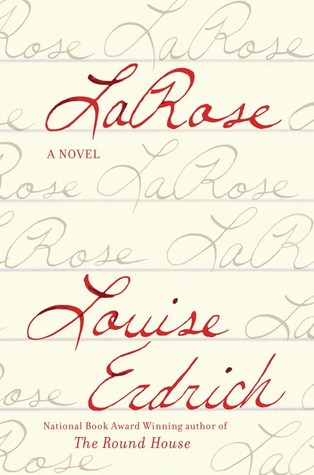Before they took LaRose to the Ravich house last fall, Landreaux and Emmaline had spoken his name. It was the name given to each LaRose. Mirage. Ombanitemagad. The original name of Mink's daughter. The name would protect him from the unknown, from what had been let loose with the accident. Sometimes energy of this nature, chaos, ill luck, goes out into the world and begets and begets. Bad luck rarely stops with one occurrence. All Indians know that. To stop it quickly takes great effort, which is why LaRose was sent.In the late summer of 1999, Landreaux Iron – an “extremely adept” Ojibwe hunter – took a clear shot at a large buck, and at the moment that he squeezed his trigger, a blur of movement caught his eye and Landreux knew that there had been a horrible accident; he had killed his neighbour's five-year-old son, Dusty, who had at that moment fallen or jumped out of the tree above the deer. After a night of praying in their sweat lodge, Landreaux and his wife Emmaline knew what they must do: offer their own young son, LaRose, to their neighbours as compensation and protection from revenge, as was done in the old days. In her novel LaRose, author Louise Erdrich begins with this concept (an old tradition that she has apparently always wanted to explore in her writing), and as the book proceeds, she goes back in time – to the 1960s and the Indian Boarding Schools, and earlier, to the 1860s and the early Trading Posts – and explores the ideas of justice and revenge and the chaotic forces that can be unwittingly loosed upon the world. I enjoyed many aspects of this novel but it's funny to me that the central idea – one family giving up a child to compensate another – affected me the least emotionally.
Quite early in the book we meet the first LaRose (the little boy who is given up is the fifth with that name in his family's history), and she is the daughter of Mink; an Ojibwe woman so desperate for food and alcohol that she would barter away her beautiful eleven-year-old girl to Mackinnon, director of the Trading Post. Mackinnon's teenaged assistant, Wolfred, is chivalrously smitten with the girl himself, but feels powerless to intervene on her behalf when he discovers that his employer hadn't exactly taken her in as a charity case.
Mackinnon had a flaccid bladder belly, crab legs, a snoose-stained beard, pig-mad red eyes, red sprouts of dandered hair, wormish lips, pitchy teeth, breath that knocked you sideways, and nose hairs that dripped snot on and spoiled Wolfred's perfectly inked numbers. Mickinnon was also a dead shot and hell with his claw hammer.Everything that happened in this timeline was interesting to me, emotionally charged, and Erdrich deftly wove in the family mythologies that were still playing themselves out generations later. When Landreaux was dropped off at a boarding school as a child (yet another young Indian given over to the white man), he meets Romeo; a boy, then man, whose long game at revenge is unparalleled. This is where my main complaint lies: we see Landreaux more and his family is central to the entire book, but I found Romeo to be much more interesting and human. Landreaux and Emmaline in their house, and Dusty's parents Peter and Nola in theirs, are all so emotionally destroyed by the accident and its aftermath – each one of them muses on how they have walled up their emotions – that I found it hard to empathise with what they were going through.
There was also much in the modern timeline about the two little boys' older siblings, and even though Dusty's sister Maggie and the demons she wrestled with were made fairly central, I couldn't get myself overly interested in their adolescent love lives, the school work, the volleyball games. I get the idea of showing us what the everyday of reservation life looks like, but beyond the scenes at the nursing home – where the kids interacted with elders including their grandmother, the fourth LaRose – I just didn't find it all that interesting.
I did like that we meet Father Travis again from The Round House; he's another fascinating character. And I liked the way that some of the characters had gifts that allowed them to traverse the boundary between the spirit world and ours. This happens in such a matter-of-fact way that it was entirely plausible in the story.
In all of these LaRoses there was a tendency to fly above the earth. They could fly for hours when the right songs were drummed and sung to support them. These songs are now waiting in the leaves, half lost, but the drumming of the water drum will never be lost. This ability to fly went back to the first LaRose, whose mother taught her to do it when her name was still Mirage, and who had learned this from her father, a jiisikid conjurer, who'd flung his spirit all the way around the world in 1798 and came back to tell his astonished drummers that it was no use, white people covered the earth like lice.LaRose is a well written book by an author I admire, but despite the interesting concept, it didn't work for me 100%. I'd give it 3.5 stars and am rounding up.

